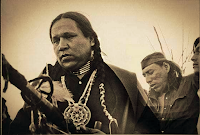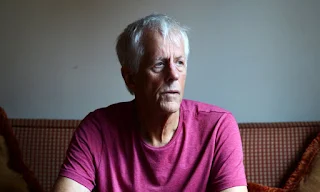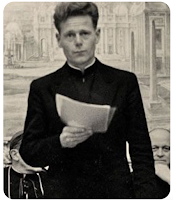Other noted deaths in the political realm include President Obama’s Senate Majority Leader Harry Reid, and two Senators who ran unsuccessfully for President, Democrat Walter Mondale and Republican Robert Dole. Also Colin Powell, Vernon Jordan and Chicago 7 defendant Rennie Davis, as well as two important labor leaders, John Sweeney and Richard Trumpka.
 |
| Leonard Crow Dog |
In the arts and entertainment, memorable figures from 50s and 60s music include Don Everly, Lloyd Price, Charlie Watt (the Rolling Stones), Michael Nesmith (the Monkees), Mary Wilson (the Supremes), Gerry Marsden (Gerry and the Pacemakers), Jimmie Rodgers (his records were among the first I bought), as well as innovative pianist Chick Corea, and celebrated theatrical songwriter Stephen Sondheim.
And Olympia Dukakis, Hal Holbrook, Cloris Leachman, Charles Grodin, Gavin MacLeod, Ned Beatty, Jane Withers, Jane Powell, Jessica Walter, Arlene Dahl, Anthony Sher, Yaphet Kotto, Norman Lloyd, Johnny Crawford…thanks for the memories.
Directors we lost include Bernard Tavenier, Richard Donner (the first Christopher Reeve Superman remains a definitive American classic), Melvin van Peebles, and the—shall we say controversial—Lina Wertmuller.
A film and television director who didn’t get his due was Michael Apted, who made fiction and documentary films about serious subjects, with taste and economy. Best known for the “7 Up” series that followed a group of English children from 7 into adulthood every seven years, he directed such diverse features as Coal Miner’s Daughter, Gorky Park, Continental Divide, Gorillas in the Mist, Thunderheart, Blink, Enigma and Amazing Grace. He also directed Bring on the Night, a documentary that followed the genesis of Sting’s first band and songs after he left the Police. It’s a movie I can see again just about anytime. It may be overall the best music documentary ever made. |
| Walter Bernstein with director Martin Ritt on the set of The Front |
I also once had a conversation with brilliant and prickly humorist Mort Sahl that was less successful, but I did have the honor of watching him read a joke line I’d written on the Dick Cavett show.
Never mind Lina Wertmuller—I had no idea Hans Kung was still alive until this year. He was the daring young voice of reform in the Catholic Church at the time of the Vatican II Council when I was in Catholic high school in the early 60s. A priest even lent me his book on reform and reunion. Since then, it seems, he got into so much trouble for his views with Church hierarchy (after the death of John XXIII) that he described his experience as his own Inquisition. He lost various official posts but kept writing popular and influential books (although not so much in the U.S.), finding common ground among religions and championing the ecumenical spirit, while continuing to oppose church authoritarianism. Star sports figures justly noted included Hank Aaron, Elgin Baylor and John Madden. I remember Bill Virdon not only as a winning major league manager but as the dependably swift center fielder for the Pittsburgh Pirates who was kind to me. As a kid I joined others on the Forbes Field diamond to meet our Pirates heroes. I first shook hands with Roberto Clemente but he seemed distracted and bored, and didn’t look at me. So I was a little embarrassed when I shook hands with Billy Virdon—until he looked me in the eye and said, “hello, son.”Among those we lost here on the North Coast was Clint Rebik, co-creator and artistic director of the Redwood Curtain theatre. I knew Clint since that theatre began more than 20 years ago. Besides being a talented actor and director, and in recent years a valued administrator at HSU, Clint was a model of integrity and kindness, generosity, good humor and judicious good sense. I wrote about his theatre and their productions for a decade, though I was also there for their first night. When I was unceremoniously dumped from my column, Clint reached out and assured me I would have a free seat there anyway. We did not know each other well, but for awhile we occasionally had coffee when I stopped by his Admissions office. He was widely admired in this community. Clint was only 55. He left behind two sons he loved, a partner and many friends.
Sam Oliner and his wife Pearl Oliner created the Altruistic Personality and Pro-Social Behavior Institute at Humboldt State University. Each authored or co-authored many books on altruism, particularly in the context of Jews sheltered from the Nazis in World War II, as Sam had been as a child. Their work pretty much created a whole new field of research, and offered an alternative to the dominant every-man-for-himself school of human social evolution.
I met them when I did an article on their work, which includes many biographical details. They were lovely people. I had lunch with Sam a time or two, and I would see them walking in Arcata, hand in hand. A few years ago, after their retirements, they moved down to the Bay Area to be closer to family. They both died in 2021, a few months apart.
May they all rest in peace. Their work and their legacy lives on.






















